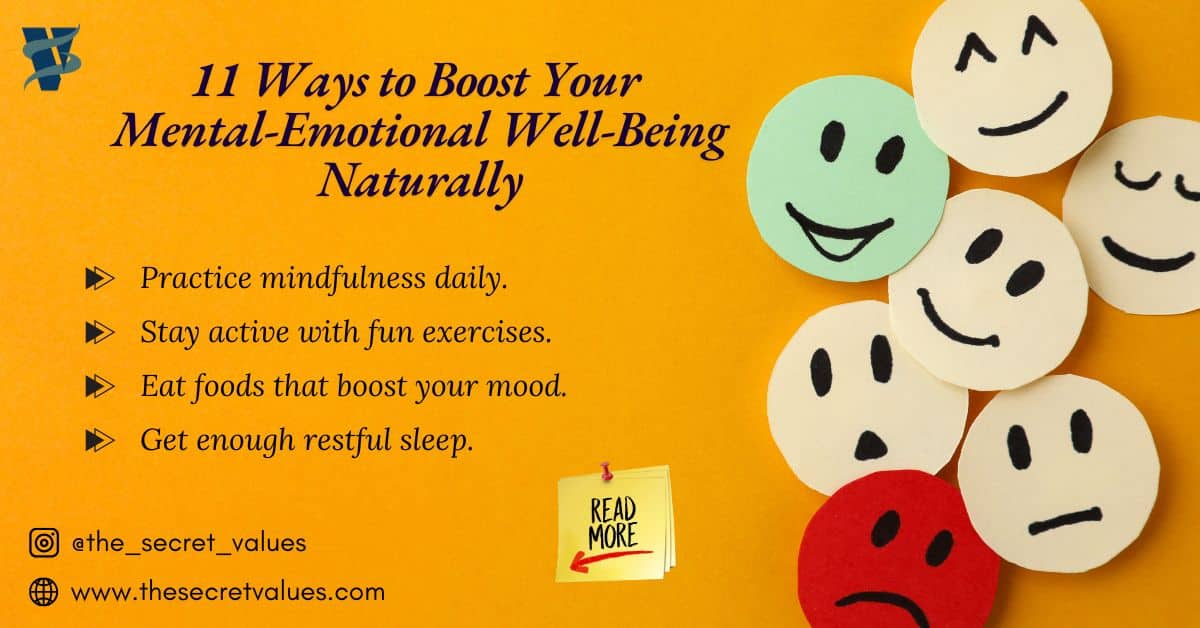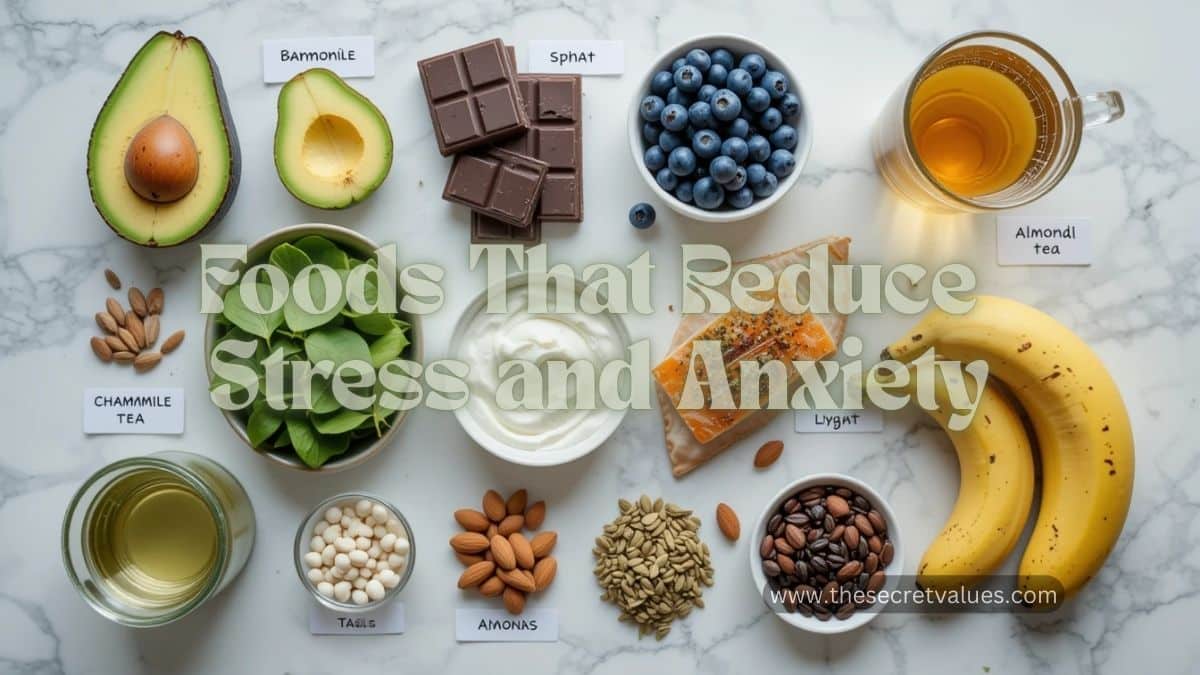Introduction
Are you experiencing stress, feeling overwhelmed, or feeling emotionally exhausted? You’re not alone! In today’s fast-paced world, mental-emotional well-being often takes a backseat. But here’s the good news: you can naturally Foster your mental and emotional well-being by creating simple, intentional choices. Let’s dive into 11 powerful strategies to help you feel balanced and energized.
The Connection Between Mental and Emotional Health

How Mental Health and Emotional Health Interact
Your mind and emotions are like best friends—they influence each other constantly. When your mental health is vital, your emotional responses tend to be more stable, and vice versa. Ignoring one can throw the other off balance.
Why Balancing Both is Key
Maintaining a balance between your mental and emotional well-being enables you to handle life’s highs and lows with strength. It involves discovering your flow so you can gracefully manage obstacles instead of tripping over them.
1 Practice Mindfulness
Understanding Mindfulness
Mindfulness is the art of being present in the moment. It’s not just about meditation—it’s about genuinely noticing the world around you.
Simple Mindfulness Exercises
Start small. Focus on your breath for 5 minutes daily, or try mindful eating, where you savor every bite without distractions.
2 Incorporate Physical Activity
Benefits for Mental Health
Exercise isn’t just for your body—it’s a treat for your brain, too! It releases endorphins, the feel-good hormones, reducing stress and anxiety.
Choosing Activities, You Love
Not a fan of running? No problem! Dancing, yoga, or even brisk walking can do wonders. The key is consistency.
3 Nourish Your Body with Healthy Foods
The Gut-Brain Connection
Did you know your gut is called your “second brain”? Your mood and mental clarity are directly impacted by the foods you eat.
Foods That Boost Mental Well Being
Load up on omega-3-rich foods like salmon and walnuts, and don’t forget leafy greens and berries—they’re brain superfoods!
4 Prioritize Quality Sleep
How Sleep Affects Emotional Health
Inadequate sleep can make you feel irritable and mentally unclear. While you sleep, your mind works through feelings and recollections.
Tips for Better Sleep
Set a regular bedtime, avoid screens an hour before sleeping, and create a calming pre-sleep routine.
5 Stay Connected with Loved Ones
The Power of Relationships
Human connection is a natural stress reliever. Spending time with loved ones releases oxytocin, the bonding hormone.
Overcoming Social Isolation
Feel isolated? Join a club, volunteer, or reconnect with an old friend. Small steps can lead to significant changes.
6 Manage Stress Effectively
Identifying Stressors
Stress is only sometimes apparent. Journaling can help you pinpoint triggers and take action.
Stress-Reduction Techniques
Try deep breathing exercises, progressive muscle relaxation, or a warm bath to unwind.
7 Practice Gratitude
The Science Behind Gratitude
Research indicates that expressing gratitude can enhance feelings of happiness and diminish anxiety. It shifts your focus from what’s lacking to what’s abundant.
Ways to Cultivate a Grateful Mindset
Keep a gratitude journal, or start your day by acknowledging three things you’re thankful for.
8 Limit Screen Time
Negative Effects of Overuse
Excessive screen time may result in eye fatigue, disrupted sleep, and anxiety. Your brain needs a digital detox, too.
Setting Healthy Digital Boundaries
Turn off unnecessary notifications, designate screen-free zones, and take regular breaks.
9 Explore Creative Outlets
How Creativity Enhances Mental-Emotional Well-Being
Creativity is a form of self-expression that fosters emotional release. It’s like therapy but with paint or music!
Ideas for Creative Pursuits
Try painting, journaling, or learning a musical instrument. No talent is required—have fun!
10 Embrace Nature
Benefits of Outdoor Activities
Nature has a calming effect. Spending time outdoors reduces cortisol levels, the stress hormone.
Simple Ways to Spend More Time in Nature
Take a walk in the park or garden, or sit under a tree and breathe in the fresh air.
11 Seek Professional Support When Needed
Recognizing When to Get Help
If life feels overwhelming despite your efforts, asking for help is okay. Looking for therapy demonstrates strength, not vulnerability.
How Therapy Can Transform Your Well-Being
A skilled expert can offer strategies to tackle obstacles and identify the patterns that hinder your progress.

In conclusion,
Mental and emotional wellness is not about being flawless—it’s about making strides. By implementing these natural techniques, you can care for your mind and spirit, fostering a life rich in tranquility and intention. Begin with small steps, remain consistent, and watch your overall well-being enhance.
FAQs
What are simple ways to improve mental-emotional well-being?
Start with mindfulness, physical activity, and gratitude. Minor, steady adjustments can lead to substantial effects.
How does exercise improve emotional health?
Exercise releases feel-good hormones and reduces stress, making it a natural mood booster.
Is therapy necessary for everyone?
Not everyone needs therapy, but it can be incredibly beneficial when facing tough challenges.
Can diet alone improve mental health?
While diet plays a huge role, the best approach is holistic, combining good food, exercise, and mindfulness.
How can I practice mindfulness daily?
Begin with 5-minute breathing exercises or focus on being present during routine tasks like eating or walking.








1 thought on “11 Ways to Boost Your Mental-Emotional Well-Being Naturally”